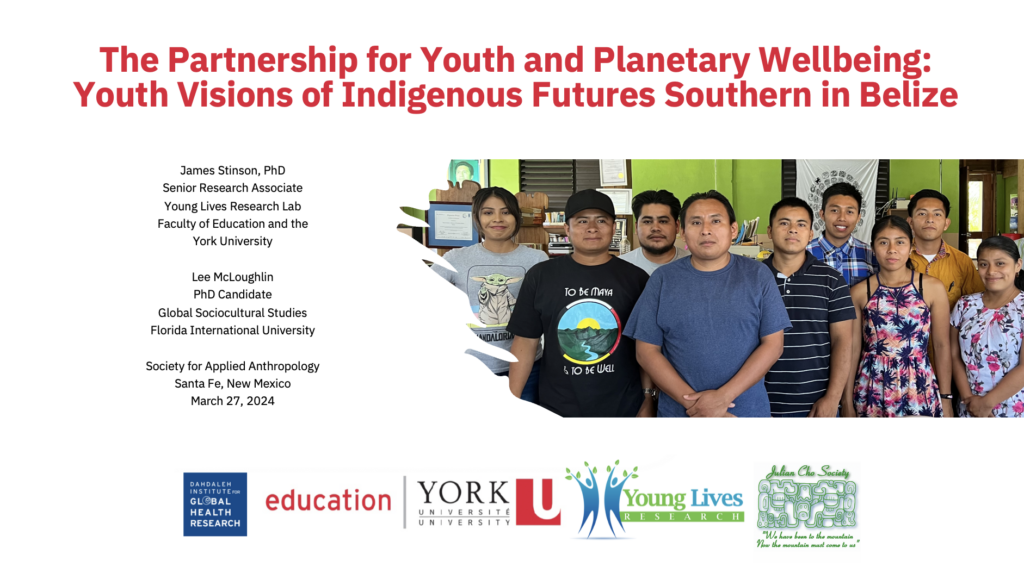Post
Published on May 13, 2024
Dahdaleh research fellow James Stinson and research assistant Lee Mcloughlin recently presented at the Society for Applied Anthropology annual conference in Santa Fe, New Mexico on a panel titled "Decolonizing Alliances for the Post-Carbon Transition." The panel explored how Indigenous/non-Indigenous alliances contribute to the cultivation of sustainable and just post-carbon ways of life, and reflected on the possibilities and complications associated with diverse approaches to alliance formation and on the roles that engaged anthropologists might play.
James and Lee presented results from the Partnership for Youth and Planetary Wellbeing project in Belize. Led by Professor Kate Tilleczek, the project is a collaboration between researchers from York University and the Julian Cho Society (JCS) in Belize. JCS is an Indigenous NGO based in southern Belize committed to supporting and promoting sustainable development and the rights of Indigenous Maya communities through research, education and advocacy. The project responds to calls for new decolonial partnerships that aim to harness, support, and foreground Indigenous and youth-centred research, education and action for planetary health.
Throughout 2023, James and Lee worked with staff from JCS to train and mobilize a team of 10 Maya youth as "young anthropologists" to conduct interviews in their communities on issues related to planetary health. They also collaborated Dahdaleh research fellow Mark Terry and the Planetary Health Film Lab to train youth in documentary film production. This partnership facilitated innovative youth-led research on the impacts of climate change, the importance of food sovereignty, traditional ecological knowledge, and the struggle to secure Indigenous land rights in Maya communities, that was mobilized for both global policymakers at the UN and local audiences in Belize. Perhaps more importantly, youth participants noted the benefits of the project on their own wellbeing through the training and skills they received, the social connections made with with other youth and community members, and the development of leadership skills and confidence building.

Themes | Planetary Health |
Status | Active |
Related Work | |
Updates |
N/A
|
People |
Kate Tilleczek, Faculty Fellow, Faculty of Education - Active
Mark Terry, Research Fellow, Documentary Film & Global Health - Alum James Stinson, Postdoctoral Fellow, Planetary Health & Education - Active Lee Mcloughlin, Research Assistant, SMART Conservation - Alum |
You may also be interested in...
Relational Accountability: Stories of Food Insecurity Told by Two-Spirit and Queer Indigenous People Living on Coast Salish Territory (or Vancouver)
A core component of a Two(Spirit)-Eyed Seeing approach – a theoretical orientation that can be widely applied to public health work – is the active and ongoing process of relational and accountable knowledge making between ...Read more about this Post
Update – Advancing Solutions that Foster Care during Times of Crises
Dahdaleh Banting Postdoctoral Fellow Chiara Camponeschi shared insights from her research, “Turning Moments of Crisis into Moments of Care”, on NPR's Academic Minute, a radio program and podcast that features the work of experts from ...Read more about this Post
Inuit Youth and Community Well-Being, Art and Hope
SeeChange Initiative has launched an awareness and fundraising campaign dedicated to supporting Inuit youth in Nunavut. The fundraiser was launched at a powerful event at Dorset Fine Arts, Toronto’s premier Inuit Art showroom gallery representing ...Read more about this Post
